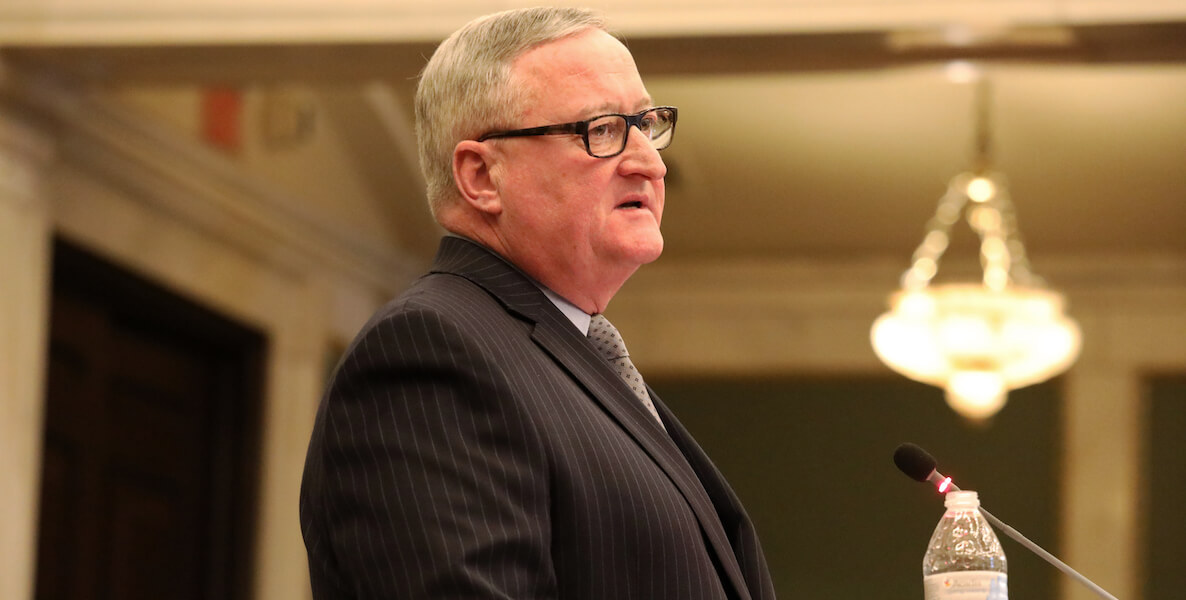![]() Periodically in recent years, anonymous benefactors in Japan have grabbed public attention by leaving wads of cash in public toilets and mailboxes.
Periodically in recent years, anonymous benefactors in Japan have grabbed public attention by leaving wads of cash in public toilets and mailboxes.
For the recipients, it was like winning the lottery without ever buying a ticket. It is the sort of charity that no government or legitimate nonprofit would think to engage in. There is no means-testing, just cash, seemingly out of nowhere.
A similar phenomenon has emerged in some parts of the United States amid the pandemic and economic fallout. Rather than finding cash in toilets, some lucky renters are finding a reservoir of goodwill in their landlords, who are of course not anonymous.
One high-profile example of this occurred about an hour and a half from Philadelphia in Montclair, New Jersey, where property owner David Placek waived rent obligations for his commercial and residential tenants for April, May and June.
![]() In a video talk organized by Montclair State University and the local business district, Placek explained that his decision was motivated by a mix of altruism and self-interest.
In a video talk organized by Montclair State University and the local business district, Placek explained that his decision was motivated by a mix of altruism and self-interest.
“Landlords should be wanting to retain tenants as much as possible right now. I have a strong feeling that the small business owner’s pool of available space is going to be pretty wide when we get back to whatever the new normal is going to be, and as a landlord myself, I would want to lock in some of those tenants for the longer term,” said Placek, who has a background in real estate and owns a few local restaurants. “We just thought it would be nice to eliminate stress.”
“Landlords should be wanting to retain tenants as much as possible right now,” said Placek. “I have a strong feeling that the small business owner’s pool of available space is going to be pretty wide when we get back to whatever the new normal is going to be, and I would want to lock in some of those tenants for the longer term.”
Placek, who has 11 commercial and residential tenants according to NorthJersey.com, said he could afford to provide his renters some relief, and he knows what it is like to live paycheck to paycheck.
That type of largesse is rare, though not necessarily because of a lack of compassion on the part of landlords. It is just not possible for many landlords because of all the other expenses that property owners have to pay.
![]() “Eighty percent of the money coming in goes to mortgage and taxes and insurance and maintenance, so I don’t know how they could get free rent,” Harvey Spear, the president of HAPCO, Philadelphia’s association for landlords, says. “We’re trying to work things out where we haven’t raised rents this year—me personally, my company. But I don’t know how anybody can offer free rents.”
“Eighty percent of the money coming in goes to mortgage and taxes and insurance and maintenance, so I don’t know how they could get free rent,” Harvey Spear, the president of HAPCO, Philadelphia’s association for landlords, says. “We’re trying to work things out where we haven’t raised rents this year—me personally, my company. But I don’t know how anybody can offer free rents.”
Mayor Jim Kenney has also said he’s unaware of any Philadelphia landlords who are giving their tenants a pass. “There could be landlords who are doing that, and God bless them,” Kenney said at an April press briefing.
With business activity reduced to a trickle to curb the spread of the deadly coronavirus, just about every sector of the economy is under some type of strain. Renters, landlords and mortgage-holding banks are all feeling it, as is City Hall, where officials are figuring out how to plug a $650 billion budget hole. In Harrisburg, officials are working out how to spend an expected $4.9 billion in federal pandemic aid.
Phyllis Chamberlain, the executive director of the Housing Alliance of Pennsylvania, said ideally about a quarter of the federal aid should go towards rental housing assistance. Next week, she plans to tout two proposals to provide assistance to landlords and tenants. One proposal would be to help cover rental costs for households that otherwise couldn’t afford it, and the other would be to establish a landlord incentive fund, which landlords could access in exchange for concessions like agreeing not to evict someone.
 “Not every landlord can choose to forgive or reduce rent, but certainly it’s a great way to keep people stable and to keep tenants in their homes,” Chamberlain says.
“Not every landlord can choose to forgive or reduce rent, but certainly it’s a great way to keep people stable and to keep tenants in their homes,” Chamberlain says.
The Housing Alliance, which promotes affordable housing, surveyed 204 landlords across the state about the impact of the pandemic and found that two thirds had lost at least some rental income, for a variety of reasons. About 12 percent reported offering their tenants a reduction or forgiveness of rent.
Even if Philadelphia landlords haven’t offered their tenants a windfall of rent-free living, the crisis has spurred some sympathy and flexibility within the rental market.
Spear says that among his tenants, about 10 percent asked not to pay rent after evictions were halted, but when they were asked to prove they really couldn’t pay, nearly everyone ponied up.
“If they couldn’t, we worked something out with them, but we can’t give free rent,” Spear says. Spear’s “substantial” supply of rental units is concentrated in and around Center City, one of the more affluent neighborhoods, so his experience may not be representative of how tenants are faring in other parts of the city. But he says, in general, landlords want to work with tenants who cannot afford rent.
Kadeem Morris, an attorney at Community Legal Services of Philadelphia, says some landlords have been very understanding and helpful during this crisis, but others have charged exorbitant late fees, refused to negotiate a payment plan, sent eviction notices even though the eviction courts are closed, and even threatened to sic immigration enforcement on immigrant tenants.
“Not every landlord can choose to forgive or reduce rent, but certainly it’s a great way to keep people stable and to keep tenants in their homes,” says Chamberlain, of the Housing Alliance.
“It’s the threat itself that’s being used as an intimidation tactic to essentially shakedown a tenant to get rent paid, when the tenant may need to prioritize food and medical bills,” Morris says.
The group has seen an uptick in illegal lockouts—where a landlord unilaterally changes the locks or shuts off utilities on a tenant, according to Morris. Morris advises tenants to proactively tell landlords if they will have difficulty making rent, get any alternative payment agreement in writing, and call the police if the landlord has locked them out.
Policymakers have already taken some steps to keep people in their homes even if they can’t afford rent anymore.
Courts and the federal government pushed off foreclosure actions around the time the economic shutdown was put into effect. In Philadelphia, the courts have pushed off evictions until June at the earliest. Landlords of subsidized housing and landlords with federally backed mortgages cannot charge late fees or send eviction notices for non-payment of rent until July, according to the Philadelphia Eviction Prevention Project.
All of that gives many renters and homeowners some breathing room, but it might just delay the inevitable if someone is really unable to pay their bills.
On Thursday, Councilmembers Helen Gym, Kendra Brooks, Jamie Gauthier and Isaiah Thomas touted a slew of bills that they said were necessary to keep people housed during the crisis.
“As City Councilmembers, we don’t have the authority to cancel rent or to provide mortgage relief to landlords at the local level,” Gauthier said. “And so the next best thing we can do is to give renters resources that they might not otherwise have in negotiations with their landlord—time and breathing room to get back on their feet without the threat of eviction looming over them.”
The package of bills would prevent rent increases, give renters the option to begin rent payment plans, and temporarily halt fees for late rent.
![]() The councilmembers didn’t say exactly what impact the policy changes would have on landlords, but they said that it would create a system where renters are in a better position to pay what they owe. As things stand now, 1,500 to 3,000 evictions are scheduled to be heard once the courts reopen, according to Gym.
The councilmembers didn’t say exactly what impact the policy changes would have on landlords, but they said that it would create a system where renters are in a better position to pay what they owe. As things stand now, 1,500 to 3,000 evictions are scheduled to be heard once the courts reopen, according to Gym.
Spear said he agrees with the proposal to waive late fees, but disagrees with many other aspects of the legislative package.
Meanwhile, although parties on all sides preach open lines of communication as the best way for landlords and tenants to emerge from this crisis intact, the situation has spurred a call for collective rent strikes—in which tenants refuse to pay their rent—as a way to “politicize that nonpayment,” as Tenants Union member Mat Wranovics told The Inquirer. But that unilateral confrontation doesn’t solve the larger issue at hand: Allowing renters to keep their homes and landlords to afford their upkeep. For that, we need programs and policies that address both parties.
Placek, the New Jersey landlord, said there are a range of financial tools to ease the burden of rent while keeping property owners whole, including amortizing the back rent over a long time, or temporarily requiring tenants to cover their own expenses. He also suggested that landlords clear any new deals with the bank that holds their mortgage.
A survey of 204 landlords across the state two thirds had lost at least some rental income, for a variety of reasons. About 12 percent reported offering their tenants a reduction or forgiveness of rent.
There is already an escape valve of sorts for landlords whose tenants are unable to come up with the rent they owe.
The last big economic collapse in 2008 was caused in large part by subprime lending, and a spate of foreclosures. With public health concerns putting a squeeze on an economy that had earlier been humming along, banks are now trying to ease the financial burden for mortgagors and other borrowers.
Councilmember Allan Domb, a real estate magnate, pushed banks to give borrowers a little leeway on their loan payments through a voluntary program known as forbearance, and he was pleased with how many agreed. Many banks are offering forbearance relief but it is on a case-by-case basis, and the relief on offer depends on the borrower’s actual needs. The dire financial situation has given borrowers some extra leverage because banks have few options.
Under forbearance, banks can opt to allow someone to skip a few monthly payments this year while tacking on additional payments to the end of the loan—so a 30-year mortgage might become a 30-year-and-3-months mortgage.
“It’s like hitting the pause button if you’re watching a TV show or something or a movie—and then coming back in three months and hitting play,” Domb says. “What’s their alternative? Foreclose on a borrower and try to rent it in this environment while no one can go outside? I think the best thing for everybody is to take a deep breath and say, ‘OK. This is a national crisis. Let’s put everything on pause, and then we’ll come back to it.’”
Tenants, too, have some extra leverage because for the moment landlords cannot legally evict them.
But the mortgage is only one expense for property owners, and many other expenses, including maintenance and taxes are continuing unabated. The city collects more than $690 million in property taxes, and as slightly more than half of Philly residents are renters, a substantial portion of that comes from rental property owners.
The federal government has more leeway to generate needed cash, and Congress has already passed new laws aimed at propping up individuals, businesses, and local governments. As lawmakers in the nation’s capital prepare for further palliative action, Kenney is asking for legislation that would give some breathing room to homeowners and renters.
“Some of the things we’re asking for from the federal government are mortgage relief and rental relief, and student-loan relief,” Kenney said last week. “We don’t have the capacity here with our economics, our revenue, to do that. But we would encourage the federal government to expand these recovery dollars as much as possible to reach people on the lower-income scale that are truly suffering.”
The Citizen is one of 19 news organizations producing Broke in Philly, a collaborative reporting project on solutions to poverty and the city’s push towards economic justice. Follow the project @BrokeInPhilly.
Header photo via Creative Commons





